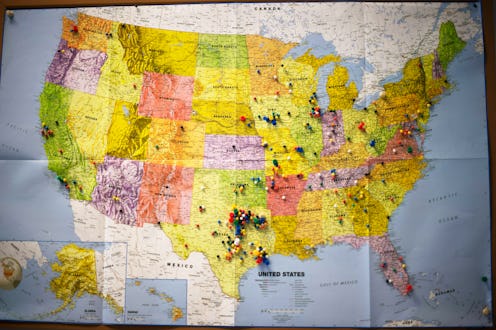News
What Brexit Should Teach America
On Friday morning in the United Kingdom, a man named Nigel Farage — a vociferous opponent of immigration in Great Britain, who once noted in a speech that parts of Britain had "frankly become unrecognizable" and now resemble "a foreign land" — said, brightly, of Britain voting to leave the EU, "We've done it without a single bullet being fired." For the country's influential politicians, almost all of whom have condemned Farage and his UKIP party, this self-congratulatory remark was almost as shocking as the result itself (Britain, after all, has some of the most restrictive gun control laws in the developed world).
Farage and the Leave campaign he fiercely supported had been almost universally described by politicians and journalists alike as xenophobic, short-sighted, and backwards. (Sound familiar?) While UKIP and Farage continued to gain traction throughout the voting population of Britain in recent years, growing UKIP to unprecedented levels of popularity between 2013 and 2015, the country's media and the vast majority of its highest-profile leaders viewed Farage and his supporters with derision, with many suggesting they represented a rogue minority. (Cough.) The current prime minister, David Cameron, ran what the British House of Lords described as a Remain campaign boasting a "positive and inclusive vision" of Britain.
Cameron lost.
It's not hard to imagine Donald Trump winning in November and saying, cheerfully, "We've done it without a single bullet being fired!" Like Trump, Farage is routinely called out for his inaccurate and xenophobic statements — remarks that are factually incorrect, but are widely reported and strike a chord. Like Trump, Farage has been viewed as a joke, a punchline, a long shot, an emblem of everything wrong with Farage's party and its older generation of right-wing supporters. Like Trump, Farage started his journey not expecting to win. Like Trump, Farage must have been pleasantly surprised to discover that his rhetoric inspired a well of popularity.
Farage's opponents ran a simple, sensible campaign, one promoting logic and unity. "We are stronger, better off and safer in Europe than we would be out on our own," had been the Remain camp's official line. Meanwhile, Trump's opponent, Hillary Clinton, has repeatedly spoken about the "better together" model.
“What kind of America do we want to be?” Clinton said in a recent ad. “Dangerously divided, or strong and united? I believe we are always stronger together.”
Even though Trump had been leading the polls for weeks before he claimed his first primary victory; even though the former The Apprentice star was miles ahead of his opponents in the nomination race before they finally, bleakly, dropped out — these victories came as a surprise. After all, deep down, much of America still thought of Trump as the joke candidate. Media outlets have taken great joy in laying bare his factual inaccuracies, his abrasive personality and stark lack of composure, and his frankly flat-out insane proposals (Muslim ban, anyone?). SNL has spoofed him. (Like, a lot .) Trump is unlike any Republican front-runner, or political front-runner, in American history.
This, the logic goes, should mean he should lose.
It doesn't.
It's true that Great Britain's choice to leave the European Union hinged on different factors than those which underpin America's choice for president in November. Yet, we can't miss what Farage's supporters and Trump's have in common: While journalists, academics, economists, politicians, and think-tanks alternately shuddered and laughed off the prospect of a victory, their supporters were numerous and completely serious. Farage and the likely next prime minister of the United Kingdom, Boris Johnson, have suffered more political snafus than a reasonable candidate could ever hope to survive. It's precisely because they're not reasonable candidates that they've not just survived, but thrived. In Farage and Johnson's case, they have won.
And as for Trump? Well, in a painful twist of fate, Trump had been scheduled to land in Britain — Scotland, to be precise — just hours after the final Brexit result. When asked by Michael Wolff about Brexit earlier this month, the two shared the following exchange, wrote Wolff:
“And Brexit? Your position?” I ask.
“Huh?”
“Brexit.”
“Hmm.”
“The Brits leaving the EU,” I prompt, realizing that his lack of familiarity with one of the most pressing issues in Europe is for him no concern nor liability at all.
“Oh yeah, I think they should leave.”
Obviously, Trump has been widely criticized for his ignorance regarding one of the biggest issues to hit Europe in recent history.
If the latest polls are any indication, it hasn't hurt his groundswell of support.
